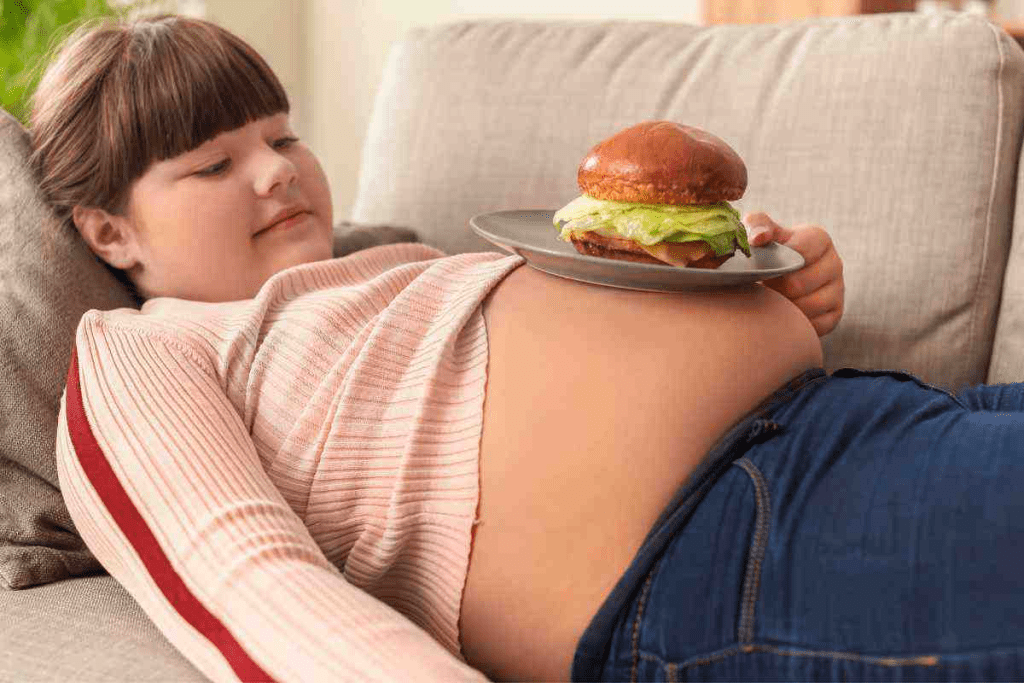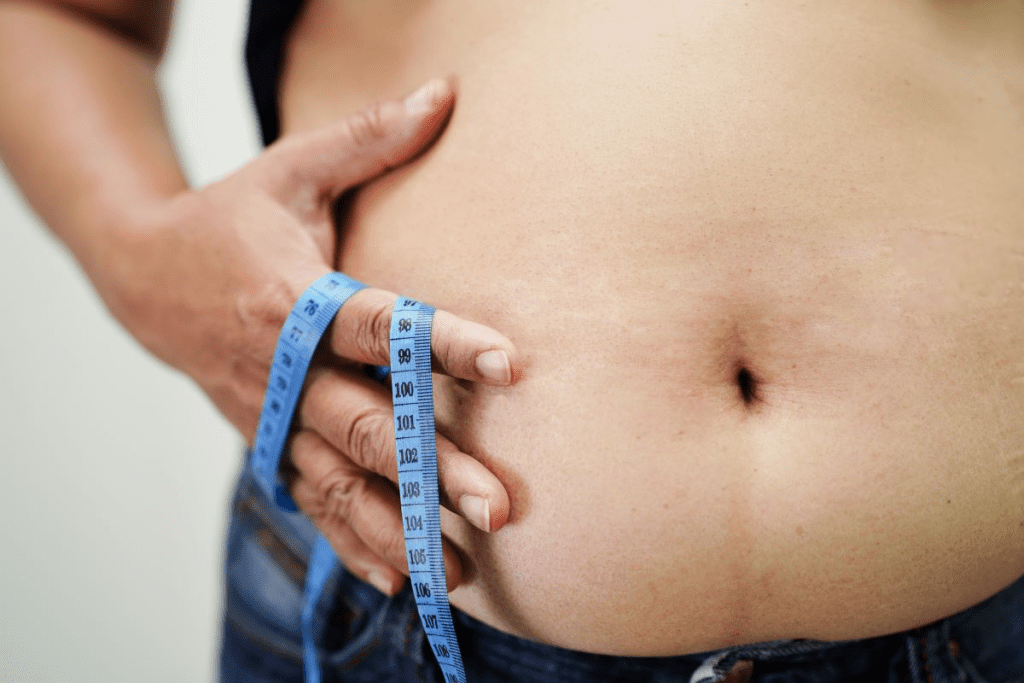Last Updated on November 14, 2025 by

A big belly in a child worries many parents. It’s common for kids to have a round tummy, but when my 8 year old daughter has a big belly, it’s natural to wonder if it’s normal or a sign of a health problem. Many things can make a child’s belly look big ” it might be because of what they eat, problems with digestion, or other health issues. Knowing the reason is key to figuring out what to do next.

The size and shape of a child’s belly can change a lot. It’s influenced by genetics, diet, and lifestyle. As kids grow, their bodies change a lot, and parents often worry about their belly size.
School-age kids, from 6 to 11, grow a lot. Their bodies change, which can affect their belly size. For example, a big belly can be normal because the abdominal wall is not fully grown yet. It’s important for parents to know that kids grow at different rates.
Some belly fat in kids is normal, but sometimes it’s a sign of a bigger problem. Parents should keep an eye on their child’s health and watch for signs of a big belly, like quick weight gain or other health issues. If a child has other symptoms with a bigger belly, it’s a good idea to see a doctor.
Childhood Obesity is a big problem worldwide, and the US is no exception. About 20.7% of kids aged 6“11 are obese. By 2025, it’s expected that 206“268 million kids aged 5“17 will be overweight, with 91“206 million obese. These numbers show why it’s key to tackle weight issues early in kids’ lives.
To know if a child’s belly size is normal or not, you need to look at their health, lifestyle, and genes. By staying informed and active, parents can help their kids grow up healthy.
A big belly in kids can come from many sources, some of which we can avoid. Knowing these causes helps parents keep their kids healthy and happy.
High-calorie, processed foods are a big reason for belly fat in kids. These foods have unhealthy fats, sugars, and sodium. They can make kids gain weight and feel bloated.
Healthy eating habits are key to avoiding too much belly fat. Eating more whole foods helps keep a healthy weight.
Sitting too much can make a kid’s stomach look bloated. Exercise burns calories, builds muscle, and boosts metabolism.
Recommendations for physical activity include at least 60 minutes of moderate to vigorous exercise per day. This can be running, swimming, or team sports.
Genetics affect how our bodies look and how we gain weight. Kids from families with obesity or certain genetic conditions might gain belly fat more easily.
Kids grow a lot, and this can change how their bodies look, including more belly fat.
Parents should watch their kids grow and talk to a doctor if they worry about their weight or body shape.
Understanding these common causes helps parents take steps to support their kids’ health. This can help prevent a big belly.

Seeing a bigger belly on your child can worry you. But it’s key to tell normal growth from health problems. Kids grow and change in ways that can surprise parents.
Between 6 and 8, kids grow a lot. Their bodies change more during this time. Some kids naturally have more belly fat during these years. This is because their belly muscles are getting stronger.
Young kids often have bigger bellies because their belly muscles are growing. By school age, their bellies usually look more normal. But some kids might keep a bigger belly for different reasons.
Studies show that fat distribution differs by gender. Girls usually put fat in their hips and thighs, while boys gain it in their bellies. Knowing this helps figure out if a child’s shape is normal.
It’s important to know the difference between real fat, bloating, and bad posture. Bloating can come from what you eat or stomach problems, and bad posture can make your belly look bigger than it is.
Watch what your child eats, how active they are, and their posture. Talking to a doctor can help understand and fix any belly concerns.
Excess weight in the belly can harm a child’s health. Kids with bigger bellies face many health risks. These include metabolic problems and even mental health issues.
One big risk is fatty liver disease. This happens when fat builds up in the liver. Early action is key to avoiding liver damage.
Too much belly fat can signal prediabetes and metabolic problems. These issues raise the chance of type 2 diabetes and heart disease later. Keeping an eye on a child’s weight is important.
Excess belly fat can also mess with hormones. Obesity can change insulin levels and affect growth. Parents should watch for these signs and talk to doctors if worried.
Too much weight can hurt a child’s mind and social life. Kids may feel bad about themselves, get bullied, or feel left out. It’s important to support them emotionally and help them feel good about their bodies.
Dealing with excess belly fat in kids is complex. But, by understanding the risks and acting early, parents can help their kids stay healthy.
Dealing with a child’s stomach weight needs a mix of diet, exercise, and habits. Parents are key in helping their kids get a healthier body.
A balanced diet is key to a healthy weight. Include veggies, fruits, whole grains, lean proteins, and healthy fats in meals. Avoid processed and sugary foods that can cause weight gain and bloating.
Drinking enough water is also important. Sometimes, thirst can feel like hunger. Encourage your child to drink water all day. A diet high in fibre can also help with constipation and bloating.
Regular exercise is vital for burning calories and building a strong body. For 6-year-olds, swimming, cycling, and team sports like soccer or basketball are great. Aim for 60 minutes of moderate to vigorous activity every day.
Making exercise fun is important. Doing activities together as a family can help create healthy habits and bond with your child.
Healthy habits are easier to adopt when everyone in the family does them. Involve your child in meal planning and cooking to teach them about healthy eating. Create routines for physical activity, like walking or jogging together.
Limiting screen time is also key. Too much screen time can make kids inactive. Encourage outdoor play and other activities to keep them active.
Talking about weight with your child should be done with care and positivity. Focus on health and well-being, not just appearance or weight. Praise their efforts and progress, and avoid negative comments.
Using positive language and encouraging healthy behaviours can help your child have a positive body image. It also helps them have a healthier relationship with food and exercise.
Parents need to understand why their child might be gaining weight in the stomach. Knowing the risks of childhood obesity helps parents act early. This way, they can support their child’s health and growth.
Many kids in the US face serious health problems because of being overweight. Childhood obesity statistics show this. Starting to address these issues early can greatly improve a child’s health later on.
Parents can help their child stay healthy by making a balanced diet plan. They should also encourage physical activities that are right for their age. Creating healthy habits in the family is key too.
It’s vital to talk about weight in a caring way. Focus on how to keep your child healthy, not just their weight. This approach helps your child develop good habits for life.
A big belly in kids can come from many things. This includes bad eating habits, not enough exercise, genes, and growth spurts. It’s key to talk to a doctor to find out why.
Some weight gain in kids is okay, like during growth spurts. But too much belly fat might mean health problems. This could be from eating too much or not moving enough.
Telling fat from bloating is hard. A doctor can check your child’s health and tell if their belly is a worry.
Too much belly fat in kids can lead to serious health issues. This includes fatty liver disease, prediabetes, and metabolic problems. It can also mess with hormones and affect their mood and social life.
To help your child lose belly fat, start with a good diet and fun exercise. Teach your family healthy habits. Talk about weight in a positive way to support them.
Teach your family to eat well and move often. Let your child help with meals and join in on activities. This creates a healthy, supportive home.
Talk about weight with care and focus on healthy living. Stress the value of self-care and self-acceptance. This helps your child feel good about themselves.
Yes, genes can affect how fat is stored in the body. But a healthy lifestyle and good diet can help manage this.
Subscribe to our e-newsletter to stay informed about the latest innovations in the world of health and exclusive offers!